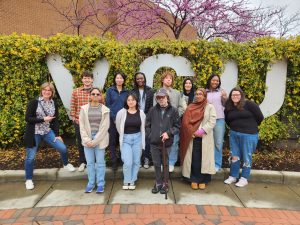
Virginia Commonwealth University’s first-ever team in the U.S. Department of Energy Solar Decathlon Design Challenge recently competed against teams from around the globe in the finals at the National Renewable Energy Laboratory in Colorado.
The team’s competition in the attached housing division ranged from Dartmouth College in New Hampshire to Myongji University in Seoul Korea.
In the Design Challenge, interdisciplinary teams are tasked with creating innovative building designs that address real-world issues related to climate change, affordability and environmental justice. In addition to design, the team must also provide proof of achieving a Zero Energy Ready home – one that is so efficient that a renewable energy system could offset most or all the home’s annual energy use, according to the DOE.
“It was not without the drive and stick-to-itiveness of this entire team to deliver a NetZero and affordable solution for multigenerational living in Richmond’s Southside neighborhood,” said faculty advisor Laura Battaglia, assistant professor of interior design in VCU’s School of the Arts and a member of the American Institute of Architects.
Battaglia noted that one judge deemed the team’s work as the best in the category of design.
The Solar Decathlon features two challenges. The first is the design-only component, which VCU competed in, and the other is a build component that requires students to design and construct fully functional houses.
“The Department of Energy offers this Design Challenge for institutions without the funding and resources for the more well-known design-build competition,” Battaglia said. “We see this as a first step; the build-out could happen in the future with enough support.”
The 12 students on VCU’s interdisciplinary team are studying interior design, mechanical engineering, urban revitalization, urban planning, and craft and material studies.
The team’s project was focused on affordability and equity.
“We teamed with the Maggie Walker Community Land Trust on a site in the Manchester area, a location facing gentrification from ongoing urban revitalization, which has led to demographic shifts and debates over issues such as affordability and displacement,” Battaglia said. “Our site on Semmes Avenue benefits from easy access to the James River Park System and provides a convenient GRTC bus stop.”
After being judged by a jury of industry experts in the first round, VCU’s design entry “made the cut” for the finals, Battaglia said. “We had great feedback from the jury.”
Following the presentation, one juror summarized the project as a “hidden gem – reflecting the history of the neighborhood while transforming it into an eco-friendly dream home.”
“This project is all about making homeownership a reality for families, with features that work for everyone, no matter what their age,” the juror noted. “It’s a win for the environment, the community and future residents – what’s not to love? This is exactly the kind of project that makes you want to pack your bags and move right in!”
Team member Mehak Chopra, a fifth-year student majoring in computer engineering in the College of Engineering and economics in the College of Humanities and Sciences, was responsible for researching grid interactivity and working on the electrical and photovoltaic systems, along with lighting plans for the project. She said the lessons she learned went beyond the technical realm of the project.
“This journey underscored the paramount significance of adept time management and conflict resolution strategies, as well as the invaluable contribution of diverse backgrounds within a cohesive team framework,” Chopra said.
When the decision was made to design a home for multigenerational living, the concept hit close to home for Isaac Saneda, who grew up in a multigenerational household.
“From that point forward, I was all in on taking the team to finals and sharing our story,” said Saneda, a senior who is majoring in mechanical engineering in the College of Engineering and was the engineering lead on the project.
Tiffani Vasco, a junior majoring in urban and regional studies and planning in the L. Douglas Wilder School of Government and Public Affairs, was one of two urban planning students on the team.
“One of my roles was to make sure we were developing a project in accordance with Richmond 300, the city’s growth master plan, and that what we were designing was equitable and would not impact the community in any negative way,” she said.
The most difficult aspect of the project was keeping it affordable, Vasco said.
“Our goal was to make the home affordable to 80% AMI [Area Median Income], which meant it could not exceed around $250,000. Utilizing the Land Trust model, we were able to achieve this, but it was not easy and there were a lot of compromises made along the way. There is a reason that net-zero-energy homes are not common, and it all boils down to cost,” she said.
The team also presented their project at the VCU Undergraduate Research Symposium on April 25 and at the College of Engineering Capstone Design Expo on April 26.
“As a professor, there is no greater joy than to see students become self-motivated and passionate about the subject matter you teach,” Battaglia said. “They have already been discussing plans for next year’s competition.”